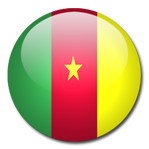International Headteacher
Menu
|
Location: Western Africa, bordering the Bight of Biafra, between Equatorial Guinea and Nigeria
Capital: Yaounde Climate: varies with terrain, from tropical along coast to semiarid and hot in north Population: 18,467,692 (est 2008) Ethnic Make-up: Cameroon Highlanders 31%, Equatorial Bantu 19%, Kirdi 11%, Fulani 10%, Northwestern Bantu 8%, Eastern Nigritic 7%, other African 13%, non-African less than 1% Religions: indigenous beliefs 40%, Christian 40%, Muslim 20% Government: republic; multiparty presidential regime |
|
Language in Cameroon
Cameroon is home to 230 languages. These include 55 Afro-Asiatic languages, two Nilo-Saharan languages, and 173 Niger-Congo languages. This latter group is divided into one West Atlantic language (Fulfulde), 32 Adamawa-Ubangui languages, and 142 Benue-Congo languages (130 of which are Bantu languages). English and French are official languages, a heritage of Cameroon's colonial past as both a colony of the United Kingdom and France from 1916 to 1960. The nation strives toward bilingualism, but in reality, very few Cameroonians speak both French and English, and many speak neither. The government has established several bilingual schools in an effort to teach both languages more evenly. Cameroon is a member of both the Commonwealth of Nations and La Francophonie. Kamtok, or Pidgin English, has in many ways been the lingua franca of Cameroon since the 1880s. It is commonly used as a vehicle for enhancing communication in this bilingual country that has approximately 250 native dialects. There are several variations on Kamtok based upon where it is used -- in grass fields, in the Catholic Church, in the Francophone areas of the country, in the southwest of the country, and among the Bororo cattle traders. Cameroonian Society and Culture The People Cameroon has a diverse population comprising approximately 250 ethnic groups that then form 5 regional/cultural groups. These are western highlanders (also called grassfielders), which include the Bamileke, Bamoun, and many smaller groups in the northwest; coastal tropical forest people, which include the Bassa, Doula, and many smaller groups in the southwest; southern tropical forest people, which include the Beti, Beulu, Fang, and Pygmies; Muslims of the northern semi-arid regions and central highlands, which include the Fulani; and the Kirdi, non-Muslims peoples of the northern desert and central highlands. Religion The constitution guarantees freedom of religion. About 40% of the population follows some form of indigenous beliefs, 40% adhere to a form of Christianity, and 20% are Muslim. The various religious groups get along reasonably well, although there have been some problems reported by religious minorities in various parts of the country. The north of the country is primarily Muslim while the south tends to have more Christians. The Family The extended family is the focus of the social system. It is the extended family and includes grandparents, cousins, aunts, uncles, etc. Members of the extended family are considered as close as the nuclear family is in the West. Family obligations take precedence over pretty much everything else in life. Individuals achieve recognition and social standing through their extended family. The young are expected to care for elderly members of the extended family; retirement homes are an alien concept. As with many family orientated cultures nepotism does not have the negative connotation. In fact, hiring relatives is part of the cultural context since it not only provides for the family, but also ensures that Cameroonians work with those they know and trust. Cameroonians who have a common background tend to organize themselves into small groups commonly called associations. Individual members refer to themselves as sons and daughters of a given community. Associations handle two major financial activities. A trouble bank is a special assistance fund to which every member contributes money at regular intervals and from which money is given to members who fall victim to a misfortune. A "njangi" is a financial activity similar to a bank based on mutual trust. An unemployed but hard working association member who does not own property or real estate may receive a loan from the njangi. Etiquette and Customs in Cameroon Meeting and Greeting
Gift Giving Etiquette
Dining Etiquette If you are invited to a Cameroonian’s house:
Business Etiquette and Protocol Meeting Etiquette Much of the information in the general etiquette section applies here.
Business Meetings Meetings are not as private as those in Europe or North America may be used to. The room can actually be shared with other people or people may walk into a meeting half-way through and interrupt. One should not take this as a sign of disrespect or lack of seriousness; once the interruption is over things will get back on track. Agendas are really part of the Cameroonian business culture. If used they generally act as a starting point for discussions rather than a map. There is a formal nature to meetings in Cameroon. It is suggested that you not remove your suit jacket unless invited to do so, as this is seen as too casual. Business communication is relatively formal and follows rules of etiquette and protocol. It is rude to turn your back on someone who is senior to you, even if it is merely to shake hands with someone else. Cameroonians are expressive communicators who practice conversational overlap - when they think that they know what you are about to say, they will interrupt you to agree, disagree, or change the subject. Many Cameroonians use proverbs when speaking to enhance their communication. Links and Resources about Cameroon * Currency - the currency of Cameroon is known as the Communaute Financiere Africaine franc (XAF). Use the free currency converter to compare to dollars, GBP or Euro. * Weather - visit Yahoo!'s up to date Weather for Cameroon. * Dialing Code - the international dialing code for Cameroon is +237. * Time – Cameroon is +1 hours GMT. |
information provided by www.kwintessential.co.uk

